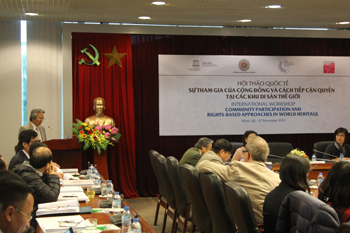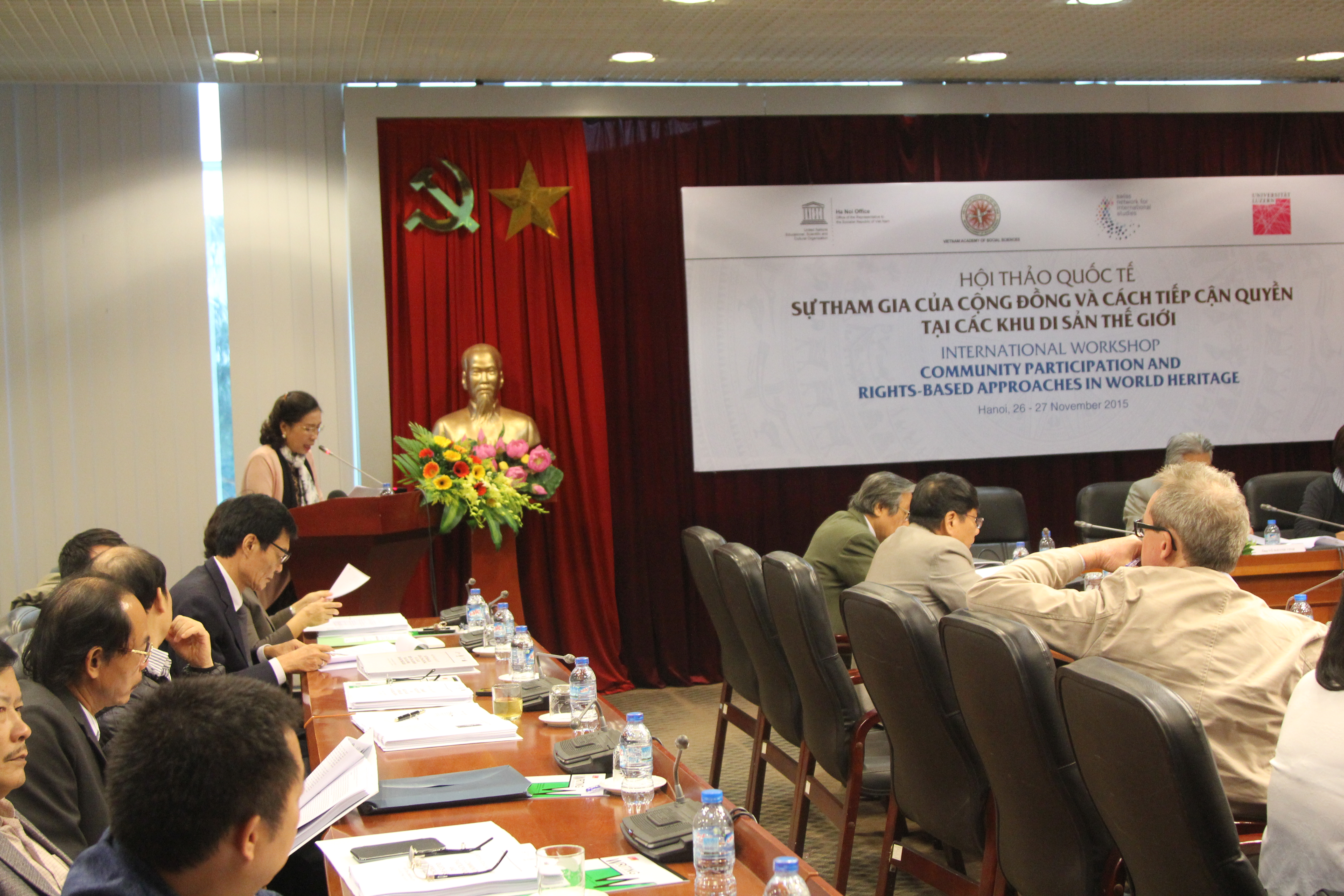 |
Attending in the workshop has Prof. Dr. Vo Khanh Vinh – Vice President of VASS, Vice President of UNESCO National Commission for Vietnam; Dr. Dang Thi Bich Lien – Deputy Minister of Ministry of Culture, Sports and Tourism; and representatives of Department of Cultural Heritage; Prof. Scientific Dr. Luu Tran Tieu – Chairman of the Vietnam Cultural Heritage; Associate Prof. Dr. Dang Van Bai – Director of Vietnamese Cultural Heritage Conservation Foundation; and representatives of UNESO in Vietnam as well as in Hanoi. Foreign speakers have Dr. William Logan – a professor of University of Deakin, Melbourne, Australia and Dr. Peter Bille Larsen –a professor of University of Lucerne, Switzerland. There are also many speakers from research groups of University of Lucerne, research group on sustainable growth and community of University of Quang Binh; research group on University of National Economics and UNESCO Hanoi; research group of Research Center for Human and Nature; and research group of Department of Natural Conservation, Ministry of Agriculture and Rural Development.
Many leaders of some ministries, industries and people committee of provinces as Ha Giang, Ninh Binh, Quang Ninh, Thanh Hoa, Hue, Quang Binh, Quang Nam have attended in the workshop. Also leaders and researchers of member units of VASS and some Hanoi and Quang Binh presses joined in the workshop.
The workshop has the especial participation of many representatives who are from areas with world heritages of Vietnam such as Conservation Center for Thang Long – Hanoi, Conservation Center for Hue ancient, Conservation Center for Citadel of the Ho Dynasty, Center for management and conservation of Hoi An Cultural Heritage, Management Board of Halong Bay, Management Board of Phong Nha – Ke Bang National Garden, Management Board of My Son Tourism, Trang An Landscape Complex Management Board, Management Board of Dong Van Karst Plateau GeoPark so on.
Having opening speech, Prof. Dr. Vo Khanh Vinh asserted that the system of world heritage includes natural and cultural heritages which are invaluable properties of humankind. The conservation and promotion of these heritages are not only the duty of each country toward humankind, but also toward the future generations. In the world, there is recently an increasing attention on the role of community in implementing World Heritage Convention. At the same time, the issues related to heritage conservation have been considered and reviewed in the relationship with human rights. The rights of those who were born and living in areas, where have world heritages, maybe positively or negatively affected. This depends on how states and management team define and solve those issues.
Although World Heritage Conventions did not directly mention to human rights but the international community has tried its best to access base on the rights toward the world heritages. Together with efforts of UNESCO, ICOMOS, IUCN and ICCROM, human rights of those who are living in world heritage area have been paid high attention and discussed in international meetings on heritages. World Heritage Committee has had many discussions on rights and considered this as a part of the process of issuing documents related to sustainable growth. These above activities have built up an international standard which has wide impact and should be evaluated and implemented in practice.
For now, there are some questions as following: How is the life of those who are living in world heritage area? How is their human rights protected? Will they receive more benefits when their living area has world heritage? On other words, there is a new issue which requires a better clarification. It is how the protection of human rights of those who are living in World Heritage area in Vietnam is protected.
|
|
|
 |
Acknowledging about the importance and role of joining with community in the sustainable growth of world heritage, representative of UNESCO Hanoi pointed out some issues. The sustainable growth will only be implemented when the responsibility and benefits toward world heritage are share between relevant sides, especially local community. In order to achieve this aim, government and offices should have campaigns to collaborate with local people then consume local products. This will not only improve the capability of local community in meeting new demands, but also improve the investment of functional offices then adjust the policies through suitable mechanisms. The final purpose of these events is to create an environment with suitable policies and great conditions for the participation of community.
According to Mrs. Dang Thi Bich Lien, Deputy Minister, Ministry of Culture, Sports and Tourisms, the participation of community is to protect and maintain the cultural heritages in general. However, what are the benefits of local community is now an issue which Vietnam has not had many experiences in both theory and practice. Therefore, she expected that the workshop will focus on discussing on this issue and learn more experiences shared by international researchers so that we could suggest usefully scientific foundation in Government’s Decree (draft) on world heritage management and conservation, then implement plans and programs with the participation of local community in Vietnam.
The workshop has 3 sessions with 14 research papers. The first session is on Theoretical and Legal Frameworks of the participation of community and rights – based approaches; The second sessions is on Some experiences and case study: Looking for issues; and the last session is on Some recommendations on policy and solutions to improve the participation of community and their rights.
In his research paper, Dr. Peter Bille Larsen expressed that the increasing knowledge of UNSECO system and Vietnam’s governmental levels will create new chances to ask for the participation of community as well as rights – based approaches at Vietnam’s world heritage. According to Dr. Peter Bille Larsen, national policy framework is creating necessary conditions and building up supporting system which facilitates to have more equally management for public. This will include specific regulations on rights – based approaches and pilot mechanism as a part of policies for specialized forests as well as national instructions on cost and benefits which should be equally shared in the world heritage management. Also, Dr. Perter Bille Larsen stressed on the essence of having a clear policy for world heritage which includes instructions for public and issues related to rights at both provincial and national level. This policy will provide financial aid, equally share benefits, and connect local community to effectively co - manage world heritages.
For Dr. William Logan of University of Deakin, Melbourne (Australia), one of the biggest lessons for governments, policy makers, and those who are working on world heritage conservation, is to listen to the voice of local community who are living in or nearby the areas with world heritage. World heritage conservation does not only depend on the actions of high level management as governments or experts, but it will achieve the highest result with the participation of local community. If we ask local community to join in confirming the important places so they will have a feeling of owners then they will help to protect those places. Respecting and accepting the knowledge and management style of local community are basic factors of an equal and completed approach in world heritage conservation.
Dr. Nguyen Ling Giang of Institute of State and Law (VASS) considered that the field of human rights should improve and protect the rights of participation and enhance the mechanism which ensures the equal rights for legal approaches such as rights of complaints or denounce, rights of legal support or rights of accessing to information related to land, environments, plans, management, rights of ethnic minorities, rights of maintaining the traditional culture including clothes, language, agriculture methods, house, cultural customs and religion so on. For the fields of heritage, all legal documents should take human rights into account when making or amending laws, decrees, or circulars. It is necessary to consider all requirements related to protecting the rights of those who are living in heritage areas as a rule of making and amending legal documents. Also, there is a demand of having a specific regulation for ethnic minorities in this area so that these regulations and mechanism could protect the participation rights of local people in heritage management or building specialized mechanism for them.
Workshop Panorama
As one of speakers of the workshop, Chu Manh Trinh of Cu Lao Cham sea conservation has expressed his idea. For him, community’s earns of living is linked with the environmental conservation and protection, and , this should be integrated with the growth of local economy. The participation of community depends on how much scientific information is transferred into knowledge and experiences of members in that community. Hence, the barriers against the participation of community could be the inequality and non-transparency of sharing benefits and responsibilities; the lack of scientific information and exploring to improve the local knowledge; lack of organization method and skills, no conversation and working with community, and lack of researches to learn of conflicts as well as to sort out these conflicts as a part of growth progress of community participation.
The workshop particularly focused on practical sharing of representatives from Vietnam’s world heritage areas which include advantages, first result and existing difficulties or challenges of protection and promotion of values of heritages, especially the community participation and rights – based approaches in these areas.
 |
In the summary speech, Prof. Dr. Vo Khanh Vinh pointed out that the workshop has focused on 3 groups of issues: the participation of community; rights – based approaches at the world heritage areas; and encouragement of related policies. As a result, it is necessary to improve the awareness of local authorities, government, and Communist Party as well as local people so that they will join in the heritage management. It is also need to complete the mechanism, policies and laws together with review, add and amend laws related to the participation of community, then edit the documents issued by local authority to provide a better conservation and development of world heritages in Vietnam.
After the workshop, it is required to build a program to propose to Ministry of Culture, Sports and Tourism for further review. Scientists should focus on practice to access to these issues under multi – dimensional and multi – industrial aspects. At the same time, it is essential to enhance international collaboration for further researches on this issue and expanding new way of partnership. Provinces which have world heritages should be more active to process researches and summarize the practice. Also, organizations should add this content into studies and teaching programs.
The workshop is a chance for scientists, management board, and policy makers to overview then evaluate the research results. It is also the opportunity to review all legal policies and the implementation of Vietnam in world heritage areas including achievements and challenges of protecting human rights in these areas in order to provide recommendations for Vietnam in next periods.
This is the first time for workshop to organize in Vietnam; however, the content of workshop will be discussed in scientific forums related to heritage and human rights management in Vietnam together with distinct studies. The results of workshop would be significant contribution to building a Decree on cultural and natural world heritage management in Vietnam which are being drafted by Ministry of Culture, Sports and Tourism.
Nguyen Thu Ha







